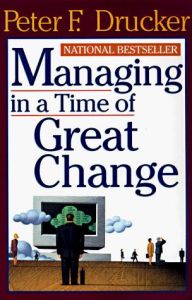Join getAbstract to access the summary!

Join getAbstract to access the summary!
Peter Ferdinand Drucker
Managing in a Time of Great Change
Plume, 1995
What's inside?
Peter Drucker’s greatest hits.
Recommendation
Peter Drucker’s greatest hits. That’s the easiest way to describe this book, which compiles essays written by the ultimate management guru from 1991 to 1994. All of these essays are about change: changes in the economy, society, business and in organizations in general. Drucker’s advice on how managers should adjust to these tectonic shifts centers around the rise of the now ubiquitous knowledge worker and the global economy. As always, Drucker’s analysis is far enough ahead of the curve that his 90s-era observations and conclusions are still relevant in the 21st century. getAbstract recommends this seamlessly organized book as the perfect introduction to one of the most important management thinkers of his generation.
Summary
About the Author
Peter F. Drucker has taught, written and lectured on business and management theories and techniques for over 40 years. Since 1971, he has been a professor of Social Sciences at the Claremont Graduate School in California. He is also an editorial page columnist for the Wall Street Journal, and has received many awards and honorary degrees for his work.









Comment on this summary